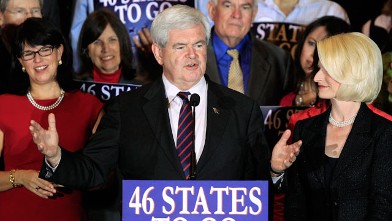Newt Gingrich Says Cash and Prizes Will Spur Space Technology

Paul Sancya/AP Photo
Moon colonies aside, Newt Gingrich has some seemingly unorthodox ideas about spurring innovation.
Forget federal grant programs or loan guarantees, Gingrich wants to win the 21 st century space race jumbo-check-and-balloons-style, with prizes, contests and challenges.
With multimillion-dollar prize purses and the prospect of nationwide bragging rights on the line, Gingrich claims such challenges will spur development for a fraction of the cost.
Gingrich proposes devoting 10 percent of NASA's budget to prizes. And with an $18.7 billion budget, Gingrich's plan would set aside nearly $2 billion to NASA-sponsored contests each year.
"You put up a bunch of interesting prizes, you are going to have so many people showing up who want to fly, it's going to be unbelievable," Gingrich said last week in Florida.
But Gingrich's contest call is old news to NASA and the dozens of other federal departments who have been running such innovation challenge programs for years.
At least 38 federal agencies have offered 151 contests and awarded more than $33 million in prizes over the past two years, said Adam Elkington, a spokesman for the General Services Administration, which manages the catch-all website for government contests challenge.gov.
Eighteen contests are currently open with prizes ranging from $200 for creating a communication campaign to raise awareness about mental health issues, to $7.5 million for developing an ultra-efficient replacement for the common light bulb.
"Generally speaking, we're trying to make it possible for a citizen inventor to exploit their innate creativity," NASA's deputy chief technologist, Joseph Parrish, said of the space program's "Centennial Challenges." "We think it's been fantastically successful."
NASA has awarded $6 million in prizes over the nine-year life of its Centennial Challenge competitions to innovators of space gloves, energy-efficient planes and other re-vamped technologies. Gingrich's plan would make that prize budget more than 100 times larger per year.
Parrish said the current $6 million price tag has "paid off many times over."
In the ultra-efficient airplane challenge, for example, competitors reported spending at least $5 million combined. NASA paid just $1.35 million in prize money.
That comparatively low-cost development could now change the face of energy-efficient aviation, Parrish said, not to mention land the winners a NASA contract.
"We think we have tilted the scale so that electrically-powered aircraft are going to be available within the next five years because of our prize," he said.
And while Parrish claims the challenge programs have been "incredibly successful" in helping NASA solve complex problems, government-issued challenges have also been a "blessing" to the contestants participating, said Manuel Cebrian, a research scientist at the University of California, San Diego, who has participated in two such contests.
Cebrian, who won a Defense Department challenge in 2009, said that without government-sponsored challenges, social scientists like himself would not have the resources to conduct such specific research.
"We don't have an official way to request funding for these things," Cebrian said. "So the only chance that we have to understand these things in vivo is when the government does it."
But, Cebrian cautioned, government-backed challenges are and will never be a replacement for research grants or in-house studies.
"I think, in general, challenges are good, but we have to be careful," he said. "If we are going to have one contest and not any follow-ups of established research programs, we're not going to get the best out of it."
Gingrich isn't the only high-profile politician pushing to increase government challenges. President Obama urged every department in his administration to increase the number of challenges and contests offered to the general public as part of a "open government" initiative in 2009.
Such challenges would create a "more transparent, participatory, and collaborative government," Jeffrey Zients, the deputy director of management at the Office of Management and Budget, wrote in March 2010 memo.
"We all have gained from this even if we hadn't participated," Cebrian said. "It's one of these common goods, these public goods."